Gibraltar U21 played reigning champions New Zealand in their last group match
Gibraltar’s last group match took them up against defending champions New Zealand, with both teams already aware that their positions in the group table would not change. New Zealand topped the group, while Gibraltar finished fourth after Zambia’s withdrawal.
After two days of rest, Gibraltar faced a hectic schedule. Their next match was scheduled for the following morning against Northern Ireland, with another fixture later that same afternoon. In less than 24 hours, Gibraltar would play three matches in the NWYC2025.
This was later changed with the new schedule now seeing Gibraltar play later on Thursday against Fiji as a newly rescheduled fixture list was published on Wednesday evening.
Wearing their new blue strip, featuring heritage Gibraltar patterns, the host team were greeted by a full stadium. A minute’s silence was held in tribute to the late Carole Alexander, one of the tournament’s technical officers, who had sadly passed away during the competition.
It was Gibraltar’s captain, Emma Torres, who put the ball into play.
New Zealand immediately applied high pressure, though Gibraltar did well to keep possession and register the first attempt on goal. However, nerves showed as the attempt was missed. New Zealand responded by scoring straight away but were denied an immediate second thanks to strong defending. Gibraltar’s second attempt was also denied under intense pressure, before New Zealand struck again with a quick attack and goal.
Just under five minutes into the match, New Zealand had opened up a five-goal lead as Gibraltar missed their first three attempts. The pressure of facing the defending champions was already evident.
Gibraltar struggled to get the ball to their shooters as New Zealand extended their lead to 10–0. The hosts did manage a prolonged period of passing, lasting a couple of minutes, which disrupted New Zealand’s momentum. With five minutes left in the first quarter, Gibraltar remained goalless despite their few attempts.
This was the first time a Gibraltar team had faced reigning world champions, and it was proving a steep learning curve. Still, the players were gaining rare international experience. While goals remained elusive, Gibraltar’s focus on keeping possession and not panicking helped to slow down New Zealand’s relentless scoring.
New Zealand had on court two players who had already represented the senior Silver Ferns—a sharp contrast to Gibraltar, whose players are still working to break into the lower tiers of women’s professional netball, far removed from world champion standards.
Backed by a vociferous crowd, Gibraltar maintained their stance and played their game. New Zealand ended the first quarter with a 22–0 lead—a heavy blow on the scoreboard, though not unexpected. Gibraltar nevertheless drew positives, particularly from their ability to play their own passing game against such a strong side, renowned for interceptions and closing down space.
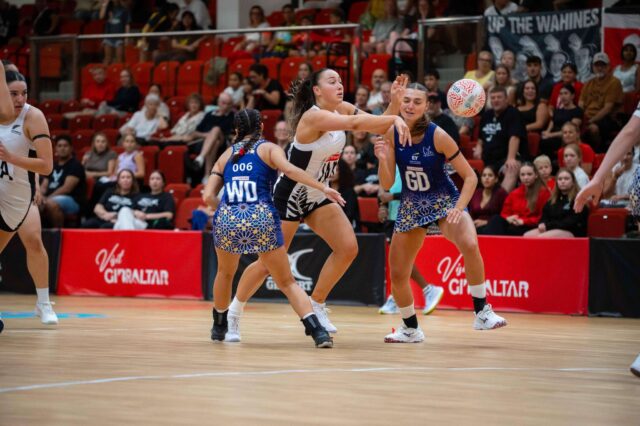
After two days without matches due to Zambia’s withdrawal and a subsequent bye, the clash with New Zealand acted as a wake-up call and valuable preparation for the upcoming match against Northern Ireland.
The young Gibraltar squad kept their heads in possession, building patiently as they tried to feed their shooters. Nerves persisted under the hoop, but with four minutes gone in the second quarter, Natasha Mena scored Gibraltar’s first goal—a major boost for the team. Facing a towering New Zealand defence, the shooters had few chances and a tough task.
New Zealand, meanwhile, rotated formations, forcing Gibraltar to stay alert and adapt in order to retain possession and find space. By the midway point of the second quarter, New Zealand led 30–1, but Gibraltar had successfully slowed their progress, preventing the defending champions from reaching the half-century mark before halftime.
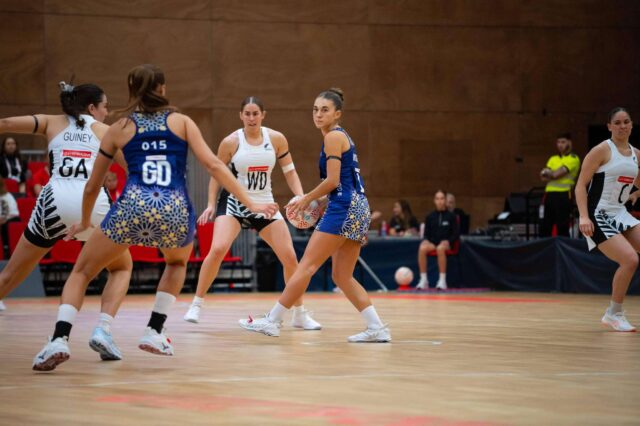
New Zealand’s transitions from defence to attack were swift and clinical, with Gibraltar unable to counter their superior height and leaping ability. The hosts’ best tactic was to stall, obstruct, and hold onto possession for as long as possible—something other teams had struggled to manage against New Zealand. Gibraltar’s coaches rotated players frequently, particularly through the centre and forward areas, balancing experimentation with the need to preserve energy for the following day.
New Zealand entered halftime with a 42–1 lead, while Gibraltar continued to search for ways to get the ball to their shooters, who had few opportunities and only one conversion.
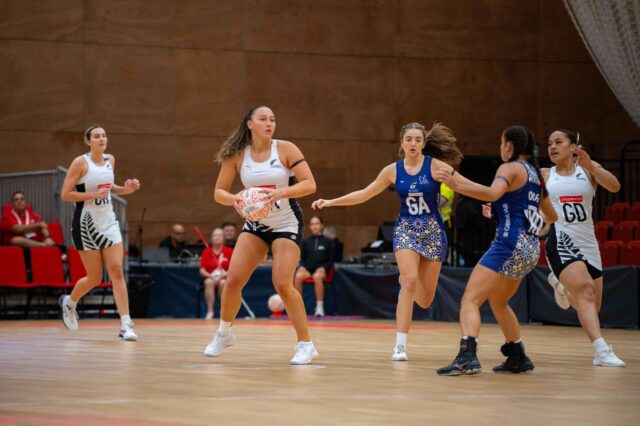
Although few expected more than a New Zealand victory given the gulf in experience, the match drew a full house. Among those watching were Gibraltar’s national football coach, national players, athletes, and former champions whose successes in European competitions had already raised the bar for Gibraltar’s sporting profile.
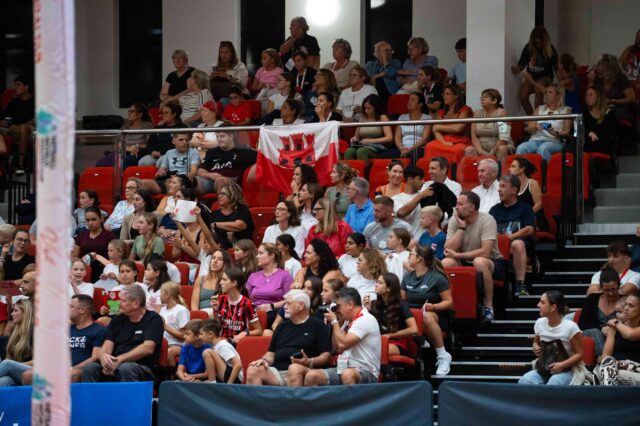
While the scoreline was one many would rather forget, Gibraltar’s presence on court with New Zealand—the reigning champions and second-ranked team in the world—will be remembered as one of the legacies of hosting the Netball World Youth Cup on the Rock.
For Gibraltar, the experience was invaluable, helping them gauge their place in the global game and highlighting areas to develop in the future. Each positive moment on court offered practical lessons for the next generation of players. Even under immense pressure, Gibraltar refused to buckle—a point of pride that was praised even by halftime.
Early in the third quarter, Gibraltar scored again, triggering another roar from the crowd. Simply working the ball into a shooting position was an achievement in itself. Commentators noted that lofted passes would always favour New Zealand due to the height difference.
New Zealand’s midcourt pressure exposed moments of static play from Gibraltar, as players tired under the pace and occasion. By the closing stages of the quarter, New Zealand’s clinical, physical game had carried them to a 56–2 lead, though Gibraltar had a goal disallowed.

Gibraltar’s third goal came with three minutes left in the quarter, immediately answered by New Zealand’s 64th. The hosts added a fourth with just over a minute to go, growing in confidence as they finally found ways to work the ball under the post. New Zealand finished the third quarter ahead 69–4.
While modest by global standards, scoring twice in one quarter against the defending champions marked a small milestone for Gibraltar netball. Their debut World Youth Cup campaign was already adding valuable moments to the sport’s local history.
A fifth goal in the final quarter was again celebrated loudly, even as New Zealand surged toward 80. The crowd’s unwavering support was clear when singing broke out from the stands. Gibraltar’s shooters, loosening up after their nervy start, added a sixth and then a seventh goal, raising their arms in celebration as they enjoyed a spell of possession and confidence.
The goalless start was well behind them, and they were edging toward a respectable two-goal-per-quarter average.
New Zealand’s march toward a century of goals went largely unnoticed by the crowd, who instead celebrated every Gibraltar success. With three minutes remaining, New Zealand hit 93, but Gibraltar responded with another goal to meet yet another small objective—and crucially, avoid being on the receiving end of a record defeat. New Zealand’s highest tally remains their 157–goal victory against India in the mid-1990s.
The final whistle blew with New Zealand 95–8 winners. Gibraltar finished the match with plenty of positives, most notably their progression from a scoreless opening quarter to three goals in the final quarter.
Fittingly, the match ended with both teams approaching the stands, New Zealand performing one of their traditional dances to show respect to the host crowd.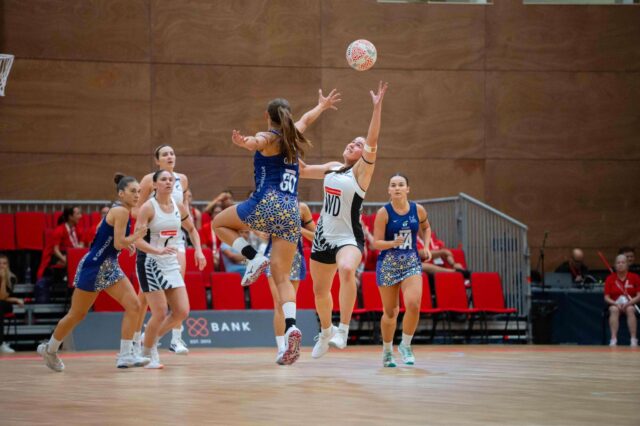
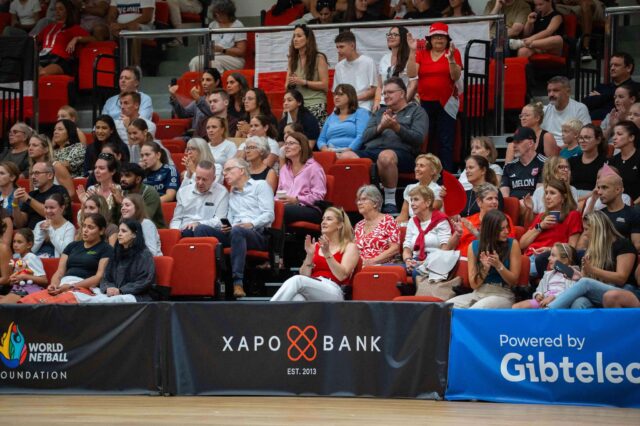
Updated: new fixture schedule for next phase of matches was published by NWYC2025 late on Wednesday with Gibraltar playing later on Thursday, this now reflected in the changes in the article.









